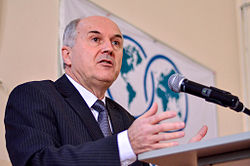Office of the High Representative
| High Representative for Bosnia and Herzegovina |
|
|---|---|
 |
|
| Inaugural holder |
Carl Bildt 14 December 1995 |
| Formation |
Dayton Peace Agreement 14 December 1995 |
| Website | www |
The High Representative for Bosnia and Herzegovina, together with the Office of the High Representative (OHR) in Bosnia and Herzegovina, were created in 1995 immediately after the signing of the Dayton Agreement which ended the 1992–95 Bosnian War. The purpose of the High Representative and the OHR is to oversee the civilian implementation of the Dayton agreement. They also serve to represent the countries involved in the implementation of the Dayton Agreement through the Peace Implementation Council (PIC). To the present, all of the High Representatives named have been from European Union countries, while their principal deputies have been from the United States. The Principal Deputy High Representative serves as International Supervisor for Brčko, representing the international community in the Brčko District.
The Dayton Agreement created the legal basis for the OHR. Its Annex 10 provides for the institution of the Office of the High Representative (OHR) in Bosnia and Herzegovina to oversee the civilian implementation of the agreement, representing the countries involved in the Dayton Accords through the Peace Implementation Council.
At its December 1997 meeting in Bonn, the Peace Implementation Council agreed in granting further substantial powers to the OHR, in order to avoid the implementation of the Dayton agreement being delayed or obstructed by local nationalist politicians. The OHR was requested to:
The Bonn powers were extensively used by the OHR in the following decade. Some examples include the adoption of the Defence reform in April 2003, with the suppression of the Supreme Defence Council of the Republika Srpska, and the amendment of Entity Constitutional Laws
Until 2004, the OHR had dismissed a total of 139 officials, including judges, ministers, civil servants and members of parliaments, sometimes along with freezing their bank accounts. After the 2002 elections, the OHR scrutinised all political candidates for major ministerial positions at Entity and State level.
...
Wikipedia

